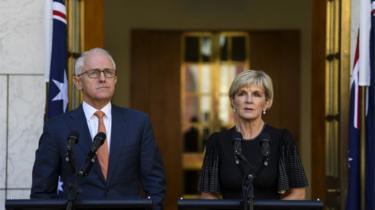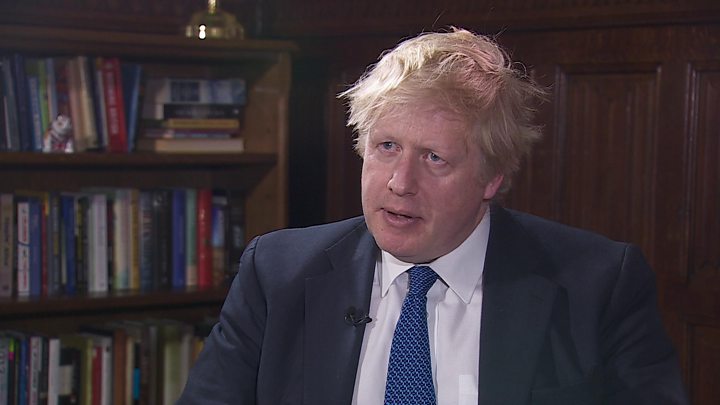 Image copyrightEPAImage caption"This is about the actions of the Russian government" says PM Turnbull
Image copyrightEPAImage caption"This is about the actions of the Russian government" says PM Turnbull
Australia has become the latest country to expel Russian diplomats as part of a global response to the poisoning of a Russian spy in the UK.
PM Malcolm Turnbull said "the brazen attack in Salisbury was an attack on all of us".
More than 100 Russian diplomats from more than 20 countries were expelled in a co-ordinated response by the US and EU nations on Monday.
Russia vowed to retaliate to the "provocative gesture".
It denies any role in the attack on Sergei Skripal and his daughter, Yulia, in Salisbury, southern England. The pair, who were poisoned with what investigators say was a military-grade nerve agent, remain in a critical but stable condition in hospital.
Australia is throwing out two diplomats suspected of being "undeclared intelligence officers".
What the diplomat expulsions tell us
What next for Russia’s spy networks?
Full coverage of the Russia spy poisoning
Backing the UK in what is thought to be the largest collective expulsion of Russian intelligence officers in history, Mr Turnbull cited interference in elections and threats to "the sovereignty of our partners".
"That is why we are taking this action today with another 23 nations round the world. We are defying this lawlessness, this recklessness of Russia," he said.
EU leaders agreed last week it was highly likely Russia was behind the nerve-agent poisoning.
But the Russian foreign ministry said the moves demonstrated a continuation of a "confrontational path".
"It goes without saying that this unfriendly act by this group of countries will not go without notice and we will react to it," its statement said.
UK Foreign Secretary Boris Johnson praised the "extraordinary international response" by the UK's allies.

Media captionBoris Johnson on widespread expulsions of Russian diplomats
In an interview with the BBC, he said "Russian behaviour needs to change" and "the world has had enough".
But he rejected suggestions that a new Cold War was dawning and stressed again that the UK had no quarrel with the Russian people.

Remarkable show of solidarity
By Jonathan Marcus, BBC diplomatic correspondent
This is building into the most serious diplomatic crisis between Russia and the West since Moscow's seizure of Crimea.
Whatever the denials, Britain's allies have clearly accepted its view that the use of a military-grade nerve agent in Salisbury was "highly likely" the work of the Russian state.
The collective expulsions from the US and EU member states is a remarkable show of solidarity with Britain, even more so because it comes at a time when UK-EU relations are strained due to the Brexit negotiations.
European Council President Donald Tusk's note that there could be "additional measures" is a signal to Moscow as it considers how it will respond.
It is a significant diplomatic victory for Prime Minister Theresa May - concerted action has now followed the strong rhetorical support from its allies. It also marks a significant toughening of the Trump administration's stance towards Moscow.

Who is expelling diplomats?
The UK announced it was expelling 23 Russian diplomats earlier this month.
Various countries announced they were making the same move in solidarity on Monday. These are:
US: 60 diplomats
EU countries: France (4); Germany (4); Poland (4); Czech Republic (3); Lithuania (3); Denmark (2); Netherlands (2); Italy (2); Spain (2); Estonia (1); Croatia (1); Finland (1); Hungary (1); Latvia (1); Romania (1); Sweden (1)
Ukraine: 13
Canada: 4, plus the rejection of 3 further applications from Russia
Albania: 2
Australia: 2
Norway: 1
Macedonia: 1
Iceland has also announced it is suspending high-level dialogue with Russian authorities, and its leaders will not attend the World Cup, which starts in Russia in June.
The UK said earlier this month it would not send ministers or members of the Royal Family to the football tournament.
EU countries that have said they have no intention of expelling diplomats include Austria, Greece and Portugal, although all have said they support the UK and condemn the poisoning.
Why are they doing it?
President of the European Council Donald Tusk said the EU states had decided to expel Russian diplomats as a direct result of a meeting, held last week about the Salisbury poisoning.
"Additional measures, including further expulsions within this common EU framework are not to be excluded in the coming days and weeks," he said.
Inside UK lab that identified ex-spy nerve agent
Has the Russian row given UK diplomacy new focus?
Ex-spy asked Putin if he could return
The US state department said in a statement: "On March 4, Russia used a military-grade nerve agent to attempt to murder a British citizen and his daughter in Salisbury.
"This attack on our Ally the United Kingdom put countless innocent lives at risk and resulted in serious injury to three people, including a police officer."
It called the attack an "outrageous violation of the Chemical Weapons Convention and breach of international law".
The US is expelling 48 envoys at the Russian embassy in Washington and 12 more at the UN in New York. It will also order the closure of the Russian consulate in Seattle.
US administration🇺🇸 ordered the closure of the Russian Consulate in Seattle @GK_Seattle🇷🇺. What US Consulate General would you close in @Russia, if it was up to you to decide
— Russia in USA 🇷🇺 (@RusEmbUSA) March 26, 2018
End of Twitter post by @RusEmbUSA
What are the precedents?
In 1986, US President Ronald Reagan expelled 80 Cold War-era Russian diplomats.
In 2016, the Obama administration expelled 35 Russian diplomats in response to the alleged hacking of the US Democratic Party and Hillary Clinton campaign during the 2016 presidential election, accusations Moscow denied.
Senior US officials told the Associated Press that Russia had an estimated 100 intelligence officials at its diplomatic posts in the US, suggesting that dozens will still be left in the country.
However, the diplomats working at the UN were described by the US State Department as "intelligence operatives", suggesting it is looking to hamper more than just administrational work.


No comments:
Post a Comment